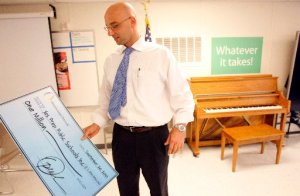The Price of Teacher Retention
By: Marla Kilfoyle and Melissa Tomlinson
One the largest factors that plagues education today is how to retain teachers in “hard to staff” areas. Research proves that the longer a teacher stays in the profession the more benefits that children have. Veteran teachers offer many benefits to not just students but to their families and to the school community. Experience arms teachers with strategies and resources that enable them to solve issues that our children face every day in school. The larger question then becomes, how do we retain teachers in “hard to staff” schools? How do we stop the revolving door so that children will benefit from stability in their school and the support from adults that they have grown to trust?
Research shows us that teachers in “easy to staff” schools stay longer. That, certainly, should not be a surprise to anyone. The larger issue is how do we keep teachers in the “hard to staff” schools so that our most vulnerable children have continuity and stability of adults who know their community and possibly their siblings and parents. Here is how you retain teachers and produce stability in “hard to staff” communities.
First, you must start in the community. The school must be an extension of the community and the teachers that are hired in “hard to staff” areas must make a commitment to be a part of the community. They should be mentored and supported to work beyond the normal school day. Teachers should be encouraged to coach or to mentor a club. It is when teachers become entrenched in a school that they develop a connection to a community and develop a desire to stay involved to help the children of the community thrive.
Research clearly shows that teachers need to feel supported. Teachers in “hard to staff” schools need to not only have support from administrators but from other staff members. They should have mentors as well as teachers who will be there to support them in everything they do. Mentoring should not be for 1 year but for 3 years. Mentoring, in most states, is only offered for 1 year but many teachers still need support beyond that first year. They should have administrators who were, themselves, master teachers. Master teachers know the trials and tribulations of being a rookie teacher. Master teachers can offer rich and sound guidance to any new teacher.
Teachers should not be placed out of their field of expertise. When teachers go to college and get an education degree in a subject it is a result of an internal passion for that subject. That passion Badass Teachers Association:












